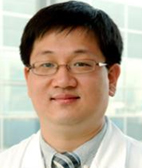
Dr. Dennis Kim, MD, PhD
Clinician Investigator
Cancer Clinical Research Unit (CCRU), Princess Margaret Cancer Centre
Department of Medical Oncology & Hematology
Princess Margaret
Cancer Centre, University Health Network
Education: 1995 graduated from Kyungpook National University, School of Medicine, Korea
Postgraduate training and fellowship appointments:
1996-2000 Residency, Internal Medicine, Kyungpook National University Hospital, Daegu, Korea
2003-2005 Clinical fellowship, Hematology/Oncology, Kyungpook National University Hospital
2005-2007 Clinical fellowship, Adult Hematology, Allogeneic BMT program, PMH, Toronto, Canada
Professional experiences:
Mar 2008-Feb 2011 Assistant Professor, Sungkyunkwan University School of Medicine, Seoul, Korea
Mar 2011-Jun 2014 Assistant Professor, Princess Margaret Cancer Centre / University of Toronto, Canada
Jul 2014-Jun 2021 Associate Professor, Princess Margaret Cancer Centre / University of Toronto, Canada
Jul 2021- Professor of Medicine, Department of Medical Oncology & Hematology, Princess MargaretCancer Centre / Department of Medicine, University of Toronto, Toronto, Canada
Publications: more than 220 peer-reviewed papers
Research activity and interests: I have 3 major subjects of research: 1) genomic-based biomarker development in post-transplant relapse and leukemia for measureable residual disease (MRD) monitoring, 2) graft-versus-host disease (GVHD) predictive biomarker development; and 3) genomics in leukemias including chronic myeloid leukemia. I am chairing the working committee for a MRD monitoring in leukemia/HCT at the Princess Margaret Cancer Centre. We have developed a consensus recommendation for MRD monitoring. I have pursued several research projects adopting genomics-based post-transplant monitoring in AML patients (Blood 2018). NGS technology has been applied for this purpose in MRD monitoring. We have successfully demonstrated that patients who have detectable MRD by NGS have a 5 times higher risk of relapse after HCT. My research work was the first report showing that NGS-based MRD monitoring can identify patients at high risk for relapse after HCT.
Another portfolio is clinical development of GVHD prevention/treatment. So far I have been involved in drug development of Ibrutinib, Ruxolitinib, Itacitinib, Entospletinib, Belumosudil, and extracorporeal photopheresis for its application in the acute/chronic GVHD treatment.
